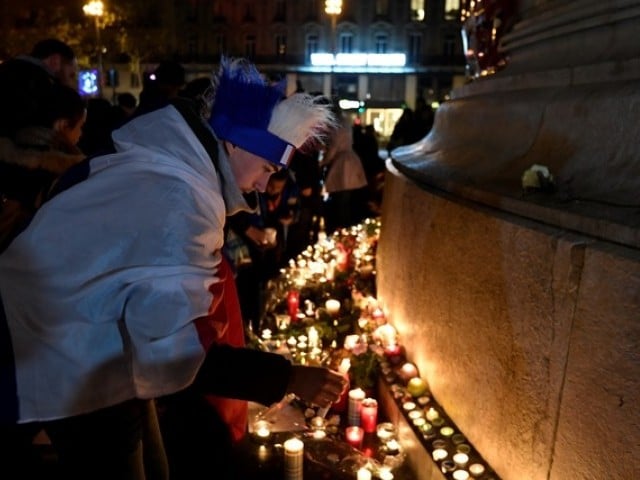France on Sunday marked the first anniversary of the Paris attacks with sombre ceremonies and painful memories for the relatives of the 130 people killed.
The day of sorrow began under grey morning skies as President Francois Hollande led commemorations at the sites where jihadist killers unleashed a bloodbath. It ended after dark as a fleet of tiny lanterns floated eerily on a branch of the Seine, each emblazoned with a message to those whose lives had been obliterated.
Hollande’s first duty was to unveil a plaque outside the Stade de France, to commemorate Manuel Dias, 63, killed by a suicide bomber outside the national stadium as France played Germany at football that fateful evening. Hollande and Paris Mayor Anne Hidalgo then unveiled plaques outside bars and restaurants in the trendy neighbourhood where gunmen sprayed bullets at people enjoying a Friday evening out.

The final ceremony took place outside the Bataclan, the revered Paris concert hall where 90 people were slain by three Islamic State attackers during a rock gig. The killers ruthlessly picked off young people lying defenceless, injured or cowering in fear. The names of those killed at the Bataclan were read out as hundreds of people gathered in silence under rainy skies. Rock star Sting reopened the refurbished Bataclan on Saturday night with an emotionally-charged show held amid tight security.
“We will not forget them,” the British singer told the crowd in French after a minute’s silence. Many wept during his first song, “Fragile”.
The Bataclan management said they had prevented two members of the US group Eagles of Death Metal — who were on stage when the bloodshed started — from entering the Sting concert, including lead singer Jesse Hughes.
Hughes had previously sparked outrage by suggesting that Muslim staff at the Bataclan may have cooperated with the attackers.
“They came, I threw them out — there are things you can’t forgive,” said the venue’s co-director, Jules Frutos. But Hughes — in Paris to attend other commemorations — said he had not tried to enter the hall at all.
“I didn’t want to see the show, I just wanted to see the place open. But I never actually tried to go into the show. I’ve never even met the dude (Frutos)… I don’t know what he’s talking about,” he said. Meanwhile, Olivier, 28, who was injured during the rampage, fought back the tears as he attended the unveiling of the plaque in front of the Carillon bar and the Petit Cambodge restaurant, where 13 were killed. He was hit in the arm by a bullet while his friend was killed by the gunmen. On Sunday he accompanied his friend’s mother to the ceremony. “I had to be here to support her,” he told a foreign media agency. “But I won’t come to any more commemorations.”
“I had to be here to support her,” he told a foreign media agency. “But I won’t come to any more commemorations.”
As night fell, Parisians gathered at St. Martin’s Canal, which connects to the River Seine, and launched a fleet of 3,500 candlelit lanterns. The red, white and blue box lights — France’s national colours — danced slowly on the waters, with messages of support written on their sides.
“We are thinking of you,” said one. “Never forget. Paris, I love you,” said another. “Liberty, equality, fraternity,” said a third, the proud national slogan that dates to the French Revolution which began in 1789.
A year on, 59 per cent of French people say the attacks have changed forever the way they view life and a similar percentage still feel “angry”, according to a poll in Le Parisien newspaper on Sunday. But among the emotions on display Sunday, a craving for tolerance and a hatred of division were also prominent.
“We must strive to combat stigmatisation and division — integration is the solution,” said Michael Dias, the 31-year-old son of Manuel Dias. At the Carillon bar, Bruno, 36, said the attacks had dampened life in the 11th arrondissement.

“But in the bars I frequent, I have never heard anyone say idiotic things like equating Muslims with the terrorists,” he said. The Islamic State group said it had struck at France because it was bombing its militants in Iraq and Syria.
Meanwhile, Prime Minister Manuel Valls told the BBC on Sunday the state of emergency declared after the attacks would probably be extended “for a few months more.” While stressing he remained “very cautious”, Valls said the risk of similar coordinated attacks on France appeared to have diminished.
“But we may face attacks of the kind that we saw in Nice,” he said, referring to the attack in July in the Riviera resort in which a 31-year-old Tunisian mowed down 86 people with a truck.







